Congress Changes FCC IG Structure
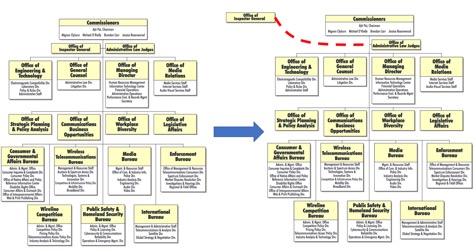
There has been a lot of press on the $1.3T spending bill that POTUS signed on March 23rd. However, there has been little press on the telecom provisions that are included in this 2000+ page bill. One that was particularly gratifying to your blogger was Sec. 501, Independent Inspector General for FCC. (p. 1869)
(As a public service, SpectrumTalk is providing a link here to the telecommunications provisions of the spending bill.)
Long time readers may recall we have been pointing out for 6 years the failures of the structure of the current FCC IG office. All the FCC IGs since the position was created in 1989 have been FCC insiders who were well known to the 8th Floor leadership and unlikely to ask too many questions. This has been true under both parties. So while the FCC IG has the same exact oversight duties as the IG at larger agencies under the IG Act, the FCC IG has consistently spent nearly all his resources, now 50+ FTEs, looking an noncontroversial issues like USF fraud. The overall effectiveness of FCC seemed of little interest. In addition, the lack of an effective IG made FCC as a whole less credible as there was no way to investigate suspicious of improper conduct on policy in a timely credible way.
Your blogger was complexly surprised by the passage of this provision and did not know it was under active consideration. We hope our repeated blogging on the issue was a positive factor in Congress recognizing this problem and correcting it.
The new FCC IG will be nominated by POTUS and subject to senate confirmation and congressional oversight.
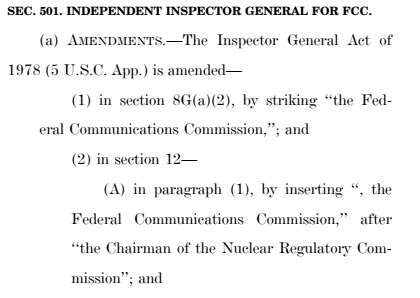
FCC's IG Failure to Examine 2014 Complaint About Questionable Comments Leads to Recurring Problems
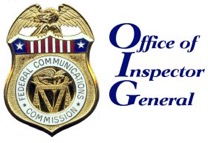
On October 8, 2014 Media Freedom.org, a right of center "Market-based group" "supported in part by communications industry and foundation contribution" filed a request with the FCC Inspector General that it investigate suspicious filings in the Net Neutrality proceeding that appeared to be filed falsely. False comments are not a new issue as your blogger recalls a few dozen that were filed in pre-ECFS days in Docket 81-413-which later became the basis of Wi-Fi and Bluetooth.
Of course, with today's electronic filing and bots the ECFS system is particularly vulnerable since it has been little improved since being first implemented in the Hundt chairmanship. All of the parallel rule makings in the Executive Branch and many of the independent agencies use the federal government-wide Regulations.gov website to handle the ministerial issue of accepting and archiving comments, but the Powell chairmanship thought it would "save money" by having a separate stand alone system. (Perhaps it is time to reexamine whether this was really a good idea?)
The subject of the FCC IG has been a recurring issue in this blog. While the statutory duties of this position are the same as the duties of all other IGs in the federal government, an odd tradition has developed in FCC in the past 2 decades that the IG is always an insider who can be trusted by the Chairman and that he spends almost all his resources, presently a staff of 60 and an annual budget of $11,751,000, on Universal Service Fund fraud issues and avoids looking at overall FCC performance and questionable activities of senior FCC officials. No FCC IG has ever been appointed from a parallel position in another agency - only FCC insiders.
So did FCC's IG ever investigate this issue after Media Freedom raised it in 2014?
Look at the Report section of the IG's website and see if you can find anything? The only possible reference to this request to the IG is this cryptic section of the IG's Semiannual Report to Congress October 1, 2014—March 31, 2015:
Not very informative is it? Media Freedom also filed FOIA requests, another recurring topic of discussion here and another recurring problem area at FCC. They got 3 batches of released documents (1 2 3) but none of them contain the slightest hint that the IG was even looking into what actually happened and whether FCC had handled it properly. (But to be nice to FCC, these FOIA releases all have a proper redaction marketing - something that has been wildly inconsistent at FCC in the past.)
As we have stated before, this blog focuses on spectrum policy and for most of the past few years had had a "net neutrality-free zone policy" of not addressing net neutrality issues and their merits in any way. But it is clear the issue of large number of questionable comments in the net neutrality proceeding has been a recurring issue and still is an issue.
Perhaps FCC senior leadership should ask the IG why he didn't address this issue in some way in 2014 when Media Freedom first brought it to their attention. If the answer is that the FCC chairman at the time did not want it investigated then that is confirmation that the IG doesn't understand his legal duties.
Perhaps FCC should invite an IG from another agency to examine independently whether the FCC IG handled this matter properly.
Maybe This ex parte Kerfuffle Will Lead to Real Reform in BOTH ex parte Rules at FCC and Its Noncurious IG
US Senate Report reveals that @TomWheelerFCC @FCC emails show "an attempt to avoid exparte filings" #netneutrality https://t.co/T7Oj4dzADM
— Rob Evans (@RobEvan57342786) March 1, 2016
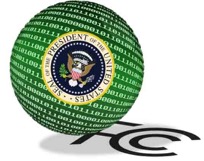
I have no idea about whether the substance of the allegations in the report are correct, but will herein address two underlying issues that have been recurring issues here:
- FCC's ineffective ex parte rules and the disinterest in enforcing them
- FCC's notoriously noncurious and not very credible Inspector General
EX PARTE ISSUES
FCC's ex parte rules were last updated in 2011 in Docket 10-43. In my comments to that rulemaking I stated (p.2)
Among all the federal involved in administrative rulemakings agencies – both Executive Branch agencies and independent agencies – only the Commission has an ex parte system that depends entirely on statements filed by outside parties as the sole source of information in its docket files. As far as we can determine, every other federal agency involved in such rulemakings uses a notification prepared by its own staff, possibly with the inclusion of material provided by the outside party.
The simple fact is that ANY outside party contacting FCC, be it the White House or a Fortune 500 company, has mixed incentives about reveals the nature of the contact and even it existence. FCC's sole focus on these parties' sole responsibility for documenting the meeting is an invitation to problems - which I saw repeatedly during my 25 years at FCC.
In the decision in this rulemaking FCC dismissed my concerns in para. 71 stating"
Other agencies may be differently situated to the extent their docket is primarily adjudicatory rather than rulemaking (e.g., the Federal Trade Commission). Also, staff summaries raise an issue of fairness. The complex legal and technical nature of the issues sometimes presented ex partemake it preferable for the parties arguing those issues to summarize them.
Perhaps the FTC's workload is more adjudicatory than FCC's, but while FCC likes to view the singular nature of its jurisdiction, FAA, NRC, and EPA all has very technical rule makings not that different from FCC's.
However, since those comments were drafted additional information has become available that contradicts one point I made and in the interests of truth I will present it here. In May 2014 the Administrative Conference of the United States, "an independent federal agency dedicated to improving the administrative process through consensus-driven applied research, providing nonpartisan expert advice and recommendations for improvement of federal agency procedures", issued a report entitled "Ex Parte Communications in Informal Rulemaking". It surveyed agency peace in the area and came up with the following conclusion:
"All agencies except two place the burden of disclosure on the agency. FCC and CFPB require the public stakeholder to disclose an ex parte communication. The other agencies either specify that agency personnel are charged with disclosing an ex parte communication or presume the burden falls on agency personnel." (p. 66)
Now my comments were filed in March 2010 and the CFBP policy on ex parte was issued in August 2011, so my comments were correct when filed. However, the CFBP policy states at §(d)(1) "If a summary of an oral ex parte presentation is incomplete or inaccurate, CFPB staff may require the filer to correct any inaccuracies or missing information." FCC rules do not address this quality control issue and the reality is that many parties talking to the FCC staff do not want an accurate public representation of what they said.
The FCC 2011 decision talked repeatedly about more enforcement of these ex parte rules. Comm. Copps said in his statement
"I am confident that the reforms we make to our ex parte rules—combined with rigorous enforcement—will usher in a new era of transparency, openness and credibility to our work.
As if on cue, FCC sent a letter in January 2012 to the Alaska Railroad Corporation, which is owned by the State of Alaska, stating it had violated the ex parte rules because an employee had sent an e-mail with attachments to an FCC staffer dealing with a rulemaking and both failed to file a copy in the docket and again failed to do so when asked by the FCC staffer. In February 2014 Alaska Railroad agreed to a 2.5 page “compliance plan” (p. 4-7) and “a voluntary contribution to the United States Treasury in the amount of ten thousand dollars ($10,000)”.
FCC also started in 2011 a new web page on ex parte violations which were previous not disclosed, perhaps due to "professional courtesy" to the private sector lawyers involved. So what has happened to ex parte enforcement at FCC since then? NOT MUCH!
The $10,000 "voluntary contribution" of the hapless Alaskan agency was a one time thing, perhaps targeted at an out-of-town cash rich entity that could be talked into paying up without questioning the legality of what was going on. The enforcement page slowly filed with entries: 14 in 2011, 2 in 2012, and 2 in 2013 - notice a trend? Last year I called up an FCC OGC official and observed there were no entries since March 2013. They quickly added 2 public notices of sunshine period violation, one for 2013 and 1 for 2014; but these are really different from all the other enforcement issues here.
Has ex parte compliance suddenly become perfect or has FCC just lost all interest in the matter?
INSPECTOR GENERAL ISSUES
FCC Inspector General has been a recurring issue here. It is a very bipartisan issue at FCC: under many chairmen of both parties there has been no interest in letting the IG perform all his statutory duties. Since the first FCC IG in March 1989, all of the incumbents have been cronies of the top leadership, apparently chosen for their lack of curiosity and willingness to spend virtually all their resources on USF fraud and related issues, with a occasional diversion to misconduct by junior FCC staffers. What about the other oversight required by 5 USC App. 4(a)(2)? No interest even though the size of the present IG staff at FCC has zoomed to 60 FTE and its budget for FY16 to $11.8M. The FCC's FY17 budget rationalizes this as
"Currently OIG only takes on top-level investigation cases and top risk finance and program audits. The Office keeps focus on increasing mission responsibility and ensuring appropriate staff levels to keep pace with the workload."
One might think that the instant allegations of improper White House ex parte contact in an independent agency such as FCC might have been handled quickly and decisively by a credible FCC IG investigation. But the decades of bipartisan cronyism between the FCC IG and FCC leadership makes the FCC IG not credible on such issues. In 2009 and 2010 I wrote here posts entitled "A Credible Inspector General Would Make FCC More Credible". It is still true.
A credible FCC IG could address the present allegations in a nonpartisan way and let the chips fall where they may. But since that is not feasible this issue will drag on probably until the end of the Obama Administration in partisan bickering that will lower already low FCC productivity.
"Field Office Modernization" OR Spectrum Enforcement Cutback
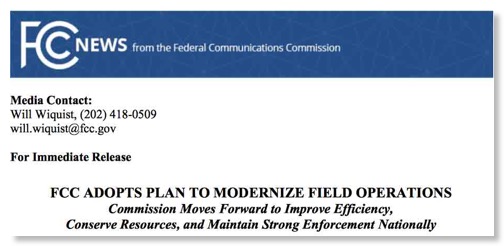
Yesterday FCC at a public commission meeting voted unanimously to
"modernize the agency’s field operations within the Enforcement Bureau. The proposal will improve efficiency, better position the agency to do effective radio interference detection and resolution and meet other enforcement needs, and save millions of dollars annually after implementation is complete."
The decision was in an Order that was adopted and released immediately. The Order states
The Field will embark on a program to update its equipment and employee skillset to address the likely issues that will accompany new and expanded uses of spectrum. This program will include the expanded use of remotely operated monitoring equipment to supplement field staff, as well as the identification and use of portable devices capable of assessing interference issues in bands expected to experience heavy spectrum use. Upon completion of all required implementation steps, the Commission will first apply the net savings resulting from this reorganization effort to this program, before applying those monies to the agency’s general fund. The net savings will not be used to increase the number of full-time non-field-related employees in the headquarters office of the Enforcement Bureau.
Now recall that TR Daily previously reported "FCC officials also have told stakeholders that the field operations would get the first shot at any money the FCC saves by closing field offices." So where are the savings going? Will there really be enough money after all these jobs are eliminated "to update its equipment and employee skillset"? While a statement has been made that savings can not be used to increase EB front office bureaucrats - comments were made at the commission meeting that EB front office bureaucrats have actually have increased significantly in the past few years - there is now little assurance it will actually go to equipment and training.
Paragraph 15 of the Order states "IT IS FURTHER ORDERED THAT all Enforcement Bureau field agents shall have electrical engineering backgrounds." Your blogger was educated and overeducated in electrical engineering. He has actually worked in spectrum enforcement. Focusing on academic credentials for such work is naive. Perhaps the intent was not to have non techies, but the skill set for solving spectrum enforcement problems in the field has little to do with most EE curriculums these days. Yes, some universities such as Virginia Tech, UCSD, NYU (now merged with "Brooklyn Poly"), and University of Texas-Austin have programs in wireless technology, but the vast majority of EE graduates have virtually no exposure to wireless technology, focusing on issues such as software engineering and semiconductor design and manufacturing. This coupled with the totally inept technical staff recruiting FCC has had for the past decade means less capability in new hires, not more. For spectrum enforcement, you need people who really understand spectrum issues intuitively. Let us go back to the MGM-produced WWII era film "Patrolling the Ether". When FCC wanted good agent then it hired ham radio operators. While having a ham license is not a perfect predictor of success, it is a better predictor of success than simply having an EE degree given the state of EE education in wireless issues now. One has to hire good people, not take short cuts in focusing on credentials!
For the past 3 decades, ever since Ed Minkel became the first Managing Director, FCC has avoided paying for personnel relocations. Will FCC pay for relocations related to this downsizing? For example, will staffers whose jobs are eliminated be eligible for FCC paid relocation to another office with a vacancy or to Washington if they are selected for a job there? We believe that the near total absence of FCC-funded relocations were both a major contributor to poor morale in field offices and has denied FCC headquarters of the historic flow of individuals with field experience and actual problems of licensees. The 2016 FCC Budget has only $55k for Budget Object Classification Codes 22, "Transportation of Things" and there is no indication of any budget for the subcategory "2210 Change of Official Station".
Finally a word to the GPS, aviation, and consumer electronics industries: Your trade associations, GPS Innovation Alliance, AOPA "Protecting your freedom to fly", Airlines for America, and Consumer Electronics Association were totally silent during the several month public debate on this downsizing that even under the best of circumstances will result in a lot fewer "boots on the ground". The broadcast industry, cellular industry, and public safety interests spoke up loudly during the deliberations on "modernization"/downsizing and as a result they got specific assurances that their interests would be attended to. Your industries were totally silent. Therefore do not be surprised to see the outcome of less spectrum enforcement on your industries may be much more severe than on those who spoke up!
- GPS: The GPDS industry is very susceptible to jamming sometimes called "privacy protection devices". FCC has the legal authority to both stop jamming and to stop the marketing of jamming devices. Will have the number of field agents and have the number of field office improve their capability?
- Aviation interests: The report that started this downsizing clearly stated that since FCC-enforced antenna marking and lighting issues have high compliance now less enforcement is needed. Fortunately aviation collisions into towers that are poorly marked, poorly lighted, or reported in incorrect locations are rare, but you know what the consequences of such collisions are! A lot of tower owners will know they are hundreds of miles away from the nearest FCC office and that the likelihood of marking and lighting enforcement has just decreased markedly. So why hire a tower caliber to replace that bulb? Fly carefully now!
- Consumer Electronics: FCC Rules serve to both limit interference and to create a "level playing field" for firms competing in the manufacture and sale of consumer electronics. In the consultant's report that lead to this downsizing, equipment marketing enforcement was never mentioned. So don't expect much in the future!
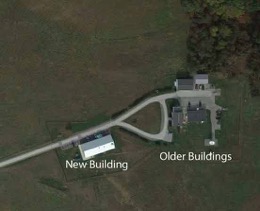
DHS's IG Investigates and Reports Whether Agency is Doing Its Job
Why Doesn't FCC IG Do the Same?
ABC News Videos | ABC Entertainment News
A breaking news item today is an investigation by the Department of Homeland Security’s Inspector Generals on how well the Transportation Security Agency is doing its statutory mission with respect to passenger screening. The acting head of TSA has already been replaced.
The FCC IG has the exact same statutory mission as the DHS IG.
The law does not differentiate between IGs appointed by the President, mainly Executive Branch IGs, and IGs appointed by some independent agencies. The mission and responsibilities are exactly the same! Yet historically the FCC IG has been content to look at petty malfeasance by junior FCC staffers and USF fraud. Whether the FCC is doing its job seems to be “beyond his pay grade”. Perhaps this is because all FCC IGs have been FCC insiders - perhaps known to the 8th floor not to be “too inquisitive”.
We are now in the middle of a proposed major downsizing of the FCC’s spectrum enforcement operation. A $750,000 outside study apparently found that spectrum enforcement was “inefficient” and morale was terrible. Did any findings in this area come for the FCC IG? Of course not! Look at the most recent FCC IG semiannual report. Other than a series of USF-related fraud issues, the only investigation disclosed specifically is the following:
FCC Employee Time and Attendance Fraud: Substantial Overtime
An employee was alleged to have committed time and attendance fraud including improperly claiming overtime pay, working fewer hours than their tour of duty required, and spending considerable time while on official duty selling personal products. According to the data reviewed by OI Internal Affairs, the employee failed to complete a full tour of duty 72 out of the 78 days or 92% of the time. In addition, forensic review of digital evidence did not substantiate the other claims of inappropriate activity while on official government time. The matter was referred to Bureau management for disciplinary action as deemed appropriate.
Look at the reports the FCC IG has released. Most deal with USF-related issues although two deal with FCC security issues. In efficiency of spectrum enforcement operations? Excessive delays in dealing with petitions files at FCC? Compliance with § 7 of the Comm Act? No time for those issues.
A credible IG would make FCC more credible.
The FCC IG is reportedly investigating now the procedures involved in the Net Neutrality decision. Given his track record, will anyone believe his report?
Amtrak, PTC, and the Need for a Credible IG at FCC
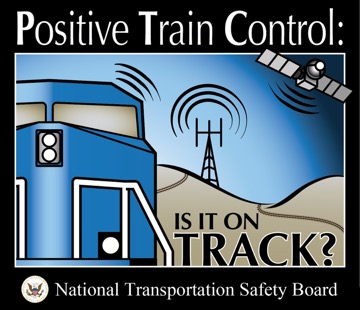
"According to Amtrak, PTC was installed in the section of track where the Philly accident occurred," a committee source writes in an email to U.S. News. "There have been delays in 'turning it on' associated with FCC dealings and getting the bandwidth to upgrade the radios from 900 MHz to something higher (for more reliability)." - US News, 5/14/15
“We continue to be actively involved in helping freight and commuter trains such as Amtrak acquire spectrum. In fact, the FCC approved Amtrak’s application for spectrum for the Washington D.C. to New York corridor after an expedited review and just two days after Amtrak submitted a final amendment to the agency in March 2015. Rail safety is a top FCC priority. Be assured that the FCC will continue to work closely with the nation’s railroads to enable the rapid deployment of Positive Train Control” - FCC/WTB Chief Roger Sherman
In the wake of this week’s fatal Amtrak train crash in Philadelphia there is a brewing controversy about FCC’s role as indicated by the above items. We have no inside information on this topic and have no opinion about whether FCC has been perfectly correct in this area or whether it may have contributed to the problem by inattention.
The issue of the need for a credible inspector general at FCC has been a recurring theme here since 2009. The FCC Inspector General Office has existed, as required by law, since 1989. But until the appointment of the current IG, all the previous IGs had been long term FCC employees who were known to be friendly to the Chairman’s Office and would not “shake the boat”. The current IG came to the IG office in 2006 after working elsewhere in FCC for 10 years before replacing his predecessor who left under a cloud.
While the FCC IG is not appointed by the President and confirmed by the Senate like cabinet agency IGs, his legal responsibilities are exactly the same - particularly with respect to the duties of § 4(a). Yet the FCC IGs over the years have kept themselves busy avoiding comments on 8th Floor actions or the overall effectiveness of FCC programs or even their compliance with the law, e.g. the Commission’ 30 history of ignoring the requirements of § 7 of the Communications Act.
Now it has been reported that the FCC IG is investigating the net neutrality decision. Perhaps, he might investigate the Amtrak PTC matter. But given the FCC IG’s indifference over the past 25 years to the overall operation of FCC and focus on only Universal Service Fund fraud and petty malfeasance of junior FCC staffers, will any FCC IG finding of agency innocence on either net neutrality or the PTC case be credible?
Isn’t it time to demand that the FCC IG be credible on all matters under his jurisdiction and not focus entirely on Universal Service Fund issues and actions of junior FCC employees?
Meanwhile, we know NTSB is investigating the crash and there certainly is a possibility that its report may fault FCC if that is where the facts lead. NTSB is less political than FCC and the House and Senate committees that FCC deals with, so its views might be a breath of fresh air.
Observations on FCC FY16 Budget
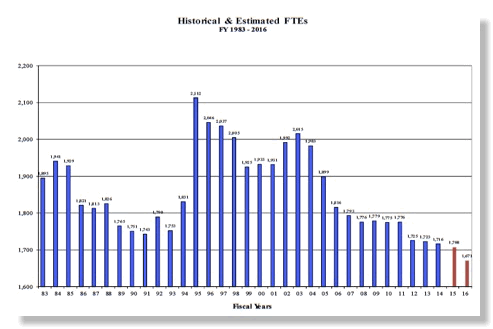
This week the President released the proposed FY2016 Budget of the US and most agencies simultaneously released their proposed budget - actually their original proposal as modified by OMB in a multi month off the record process in parallel with all other agencies’ budgets. (FCC may be an “independent agency” in many respects, but in budget matters it is treated as a member of the Executive Branch.) As usual, FCC posted it in an obscure place on its website without public announcement. However, a few days later for the first time in the history of the FCC website it showed up in the rotating headlines in the upper left corner of the FCC’s homepage. Here is a link to the FCC’s FY16 Budget Proposal to Congress.
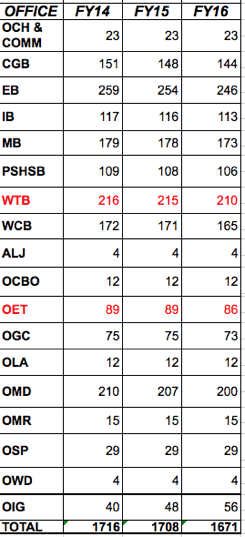
Note also that that the WTB/OET team is actually a profit center for the US Government as the recent auction results show. Yet both are drifting down in size. Some might say attrition. So while FCC faces real backlogs with dealing with new technology issues such as millimeter waves that threaten US technical leadership and also with resolving interference issues that need policy decisions that threaten the operation of incumbent licensees, the staff working on these issues will actually decrease.
What is increasing? As can be seen in the next to last line of the table, the FCC’s Inspector General’s staff is increasing from 40 to 48 to 56! The justification fro this is to fight Universal Service Fund fraud. When AT&T was a monolithic near monopolist it was agreed between them , FCC, and Congress that they would transfer money around within AT&T to subsidize rural local telephone rates with income from long distance calls. This worked well until divestiture in 1984. USF was the replacement mechanism for the old money flows internal to the old AT&T. Billions of dollars flow through the USF from our phone bills and fraud is inevitable as FCC seeks to encourage new technology with the program. So there is nothing wrong with increasing attention to such fraud and it is actually cost-effective for the tatx payer to reduce the fraud.
But, as we have pointed out previously and repeatedly, despite the good and important work OIG does on USF fraud, that is not the whole job of that office under the terms of the Inspector General Act. Until the current IG, all the previous ones were cronies of the Chairman and long term FCC staffers. They did not want to find unpleasant things that would reflect poorly on their patron. Even though the current IG is unlike his predecessor in background, he seems to follow the office tradition he inherited of not asking questions about how well FCC is run. Other agency IGs do and their statutory charter is exactly the same. So if the FCC IG gets 56 FTE in FY16 will he break with the past and use some of this for the matters he and his predecessors have been carefully avoiding in the past?
Washington Times' FOIA Request on FCC Employees & On-the-job Web Porno Use
For one Federal Communications Commission worker, his porn habit at work was easy to explain: Things were slow, he told investigators, so he perused it “out of boredom” — for up to eight hours each week.
Lack of work has emerged time and again in federal investigations, and it’s not just porn, nor is it confined to the FCC. Across government, employees caught wasting time at work say they simply didn’t have enough work to do, according to investigation records obtained under the Freedom of Information Act.
It went on to say
“A spokesman for the FCC declined to comment on what, if any, action the agency took after the FCC’s inspector general singled out the eight-hour-a-week porn peeper.”
So your conscientious blogger was curious to see what was the source of this information and the larger context. Sending an inquiry to FCC, I received the FOIA response that the Times had received within 3 days - great service!
However, as is typical at FCC it was more redacted than even CIA and NSA! Take a look at the document at left that was sent to the Times reporter with a cover letter signed by the FCC’s IG. Several observations:
- It is really a package of 5 investigations from to July 2013 to March 2014. In one case no violations were found, in the other 4 violations were found.
- Despite the excessive redactions, they were not done very carefully. For example on p. 5 of the pdf we find that the computers suspected to have been used for porno were located in “Room CY-C247 of the FCC’s Portals II facility”. We also learn that an FCC employee and a contractor were both suspects. This was a case where no violations were found! We also find out on p. 32-33 of the package that it involved the “HFDFADMIN2-HP workstation”. While this may mean little to the redactors, it is clear to your blogger that this means the HF/short wave monitoring system formerly operated by the Enforcement Bureau and its predecessors, but now operated by the Public Safety and Homeland Security Bureau with virtually no public information. This system is operated from a newly constructed building at the FCC’s Columbia MD property, behind the Laboratory and closer to the EB field office, that I don’t think was ever publicly announced even although it is the first new FCC owned building in several decades. (Oddly, the building is not on satellite photographs on Google and comparable sites.) It is amusing to note that the secretive activities of this PSHSB activity are done by people who have high security clearances but access porno while on the job! (Here is one of FCC’s few cryptic detailed public references to this HFDF system that is perhaps the most secretive part of FCC.)
- While the FCC has a “Freedom of Information Act Electronic Reading Room” that says it contains “Records disclosed in response to a FOIA request that ‘the agency determines have become or are likely to become the subject of subsequent requests for substantially the same records.’ “ and one might think this package of document meet that description, in reality previously FOIA’d information is not there. May it is somewhere on the FCC’s chaotic site, but your blogger hasn’t found it. By comparison, CIA, NSA, and NRC make previous FOIA releases actually available!
- FCC continues to have little interest in complying fully with the following provision of 5 USC 552(b): “ If technically feasible, the amount of the information deleted, and the exemption under which the deletion is made, shall be indicated at the place in the record where such deletion is made.” Thus there is no indication in this FOIA release of the justifications. While it is reasonable to think most of the redactions are reasonable, the statute appears to require that FCC give at least an exemption number for each or allege that some exemption number applies to all. There is no such indication in the released redacted document.
- The NRC IG recently released a 32 page audit report reviewing that agency’s FOIA practices, finding some problems, and making constructive suggestions. We suspect many of these suggestions would apply also to FCC. In view of the fact that the FOIA release discussed here was managed by the FCC’s IG, signed by him and had problems as discussed above, we urge FCC to have an independent review of its FOIA practices. While the President’s 1/21/09 FOIA/Openness memo is not formally binding on FCC, one might think that it would have a high influence on at least the 3 Democrats at FCC.
- IGs at other agencies under the same exact statutory charter as the FCC IG make periodic public reports on some of the investigations they have made of internal agency operations. FCC’s IG only issue the minimum required semiannual report and it does not discuss internal problems and possible improvements. The period of the 5 investigations covered in this FOIA release is covered by 2 semiannual reports : April 1, 2013 through September 30, 2013 and October 1, 2013 to March 31, 2014. While the first report (p. 23) cryptically alludes to a “separate investigations based on significant amounts of pornographic material”, there is never any discussion in either about the other investigation and findings. While the IG should not make his whole finding public for a variety of good reasons, his reporting on internal investigations is at best questionable.
NPR Interview on a "More Mellow" NSA
The National Security Agency "would welcome" the creation of a public advocate's position at the court that oversees its electronic surveillance programs, said its outgoing deputy director.
John C. "Chris" Inglis, who retires Friday after more than seven years as the NSA's No. 2, told Morning Edition host Steve Inskeep that "I would only put the caveat on there that it needs to be operationally efficient."
"So, let's say that I'm authorized to target the head of al-Qaida worldwide and I'm actively doing that," he continued. "I'm trying to figure out what communication services — selectors — that person is using. If at every moment in time somebody had to authorize me to put the next selector on — 'He just changed his email address, can I put that on?' — if that's where the advocate stands in, that's operationally not terribly efficient.
"But if there's going to be some novel interpretation of the law — if there's going to be some authority that's going to be applied as an extension of the law [that] might say, 'I've got a different view,' we'd welcome that."
The interview is a refreshing breath of fresh air in the polarizing debate over the impact of the Snowden disclosures. Perhaps a real dialogue is possible?
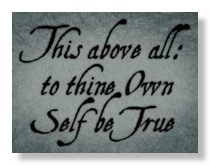
We recommend that the current commissioners demand a report from the staff over what exactly was FCC’s role in this and what lessons were learned. Perhaps the FCC IG might do this to get away from his usual practice of focusing solely on USF abuse and avoiding anything that might embarrass top leadership even though his statutory mandate is the same as all other agency IGs. (While the IG statute allows some cabinet secretaries to order their IGs to stay away from specified intelligence issues, the FCC IG is not subject to such a statutory limit.)
FCC IG: "Fast and Furious" Report Highlights Comparison with Other Agency IGs Who Do Their Whole Job
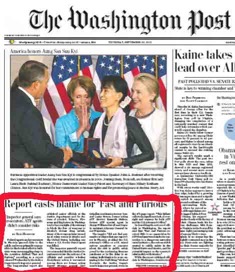
While the current IG does not have this background, he has continued the pattern set by his predecessors and focused almost exclusively on the fraud aspect of his charter (with the Universal Service Fund and Telecommunications Relay Service there is certainly enough fraud in FCC-related programs to keep one busy) with occasional forays into obscure issues such as “procedures to ensure that digital copiers or scanners, when going off lease or being deaccessioned, contained no sensitive, confidential, or personal data.”
As I have written before, “A credible IG would make FCC more credible”. At NRC, another independent commission, the IG played a key role in curbing the excesses of their recently departed chairman. Clearly Chmn. Martin had no fear that FCC’s IG would similarly cramp his style as his excesses forced the FCC into being dysfunctional during his term. Yet the FCC IG, the NRC IG, and the DOJ IG have the same statutory charter.
The fact that the FCC IG is appointed by the Commission not the President does not give him a free pass on his mandate to review existing programs and activities for their effectiveness. Indeed, the nonpresidentially appointed IGs, such as FCC’s, have special protection against arbitrary dismissal to encourage their independence.
So, FCC IG David Hunt, if you want to start doing your whole job here are some topics you might want to dig into that go back more than a decade:
- Why does the FCC consistently ignore Section 7 of the Communications Act?
- Does the lengthy delays associated with new technology deliberations discourage capital formation for wireless technology innovation unnecessarily?
- Why do petitions to FCC consistently get “lost” without any visibility and FCC and go for years without any action? (Here’s an example.)
- Why has FCC been unable to resolve the Docket 10-4 controversy even though the stalemate is clearly hurting all parties including the public?
Docket 10-4: 6+ Years of FCC Inaction Turns an Emerging Interference Issue into a "Lose/Lose" Situation
On November 2, 2007, CTIA, the Wireless Association (CTIA) filed a Petition for Declaratory Ruling (CTIA Petition) regarding the proper use of signal boosters in Commercial Mobile Radio Services (CMRS).
Hence there was no explanation for the over 2 year delay in responding to this petition from a very powerful trade association. If a trade group as powerful as CTIA can be ignored for 2+ years, one wonders how much attention a mere startup company would get? Since the 1st Amendment guarantees the right “to petition the Government for a redress of grievances” and the APA reiterates this right, "Each agency shall give an interested person the right to petition for the issuance, amendment, or repeal of a rule" (5 USC 553(e)), it is puzzling that FCC in recent decades have given most petitions such little attention. When Bob Foosaner was head of WTB’s predecessor in the 1980s, he argued pragmatically that petitions had to be either dismissed or put out for public comment in about a month, for otherwise the embarrassment of inaction impacts the real options.
(While the delay from the filing of the petition to the FCC PN was 26 months, the petition included as an attachment a “WHITE PAPER ON THE HARMFUL IMPACTS OF UNAUTHORIZED WIRELESS REPEATERS” that had been submitted to FCC on May 1, 2006! Thus CTIA had formally contacted FCC about the interference from bidirectional amplifiers almost 4 years before FCC took any public action, such as asking for comments, on this issue! Below is a section heading from the CTIA 2006 white paper)
![]()
Unfortunately CTIA’s documents failed to recognize that although early amplifiers sometimes caused interference, they were also of real benefit to consumers who suffered from marginal cellular coverage especially in rural areas. They also were very popular among public safety users, although they also complained about interference from early models (still permitted due to the impasse in this proceeding). Thus the total prohibition of amplifiers that CTIA sought was unreasonable, although it took a long time for key CTIA members to come to this realization.
We have argued here previously that emerging interference issues are inevitable in the dynamic wireless area and need to be addressed and “nipped in the bud” before they get worse. The 10+ year delay of dealing with police radar detector interference to VSAT terminals is an example of ignoring a problem until it becomes unmanageable and then putting burdens on all involved to solve it. (FCC has never even acknowledged publicly that it was aware of this problem for 10+ years before taking action!)
So what has happened in the 6+ years since CTIA’s white paper was filed? Since there has been no regulation adopted to address the issue of amplifiers that oscillate like PA systems with a microphone too close to the speaker, low end manufacturers still sell such amplifiers in the US market and presumably continue to cause interference. High end US-based manufacturers have switched to designs that are protected from oscillations and do not cause this interference - although the present designs they might cause much less frequent problems through more obscure mechanisms. However, due to regulatory inaction by FCC, low end manufacturers can continue to sell early generation units that can and do oscillate and cause interference to cellular systems.
So,
- Cellular operators continue to get interference from existing and new amplifiers that come from low end manufacturers and which continue to be legal in the current regulatory impasse.
- Legitimate amplifier manufacturers with updated designs that don’t oscillate suffer price competition from low end makers who undersell them with equipment that threatens cellular systems AND during the pendency of this rulemaking have limited access to new capital for improved equipment design due to regulatory uncertainty during the tendency of this proceeding. At least one of these manufacturers actually makes the units in a small US town in a “red state”. One new US entrant who contacted me several years ago about entering the market with an oscillation-protected design never got the financing he needed - probably due to regulatory uncertainty.
A true “lose/lose” situation! Due to the deadlock both sides (as well as the public) suffer!
Meanwhile the CTIA membership can’t make up its mind what the powerhouse should press for and meanders like a rudderless ship. A recent filing has a table summarizing the positions of the various carriers with respect to the “Joint Proposal” of Verizon Wireless and Wilson Electronics for reasonable regulation of amplifiers.
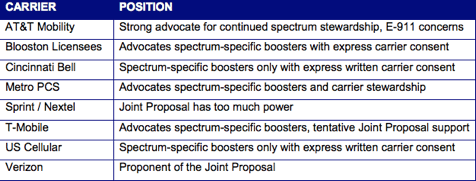
Comparison of carrier positions from Millard/Raines Partnership 5/12 filing
What is needed here is some real leadership either in the cellular industry or at FCC. While reasonable people can disagree on the best solution, most will agree that a solution is in everyone’s interest. Perhaps FCC should send an ultimatum to the industry to come up with a unified position within 2 months or else FCC will moved directly to a decision based on the current record.
It is nice to try to be everyone’s friend, but that is not a good way to run a regulatory agency in a fast moving technical area. Some times you just have to make a decision and move on.
It has been over 6 years since CTIA said
![]()
Now is the time for action! This problem is not “rocket science”, rather the impasse reflects a basic problem in FCC spectrum policy: an unwillingness to tackle basic Title III issues that are part of the Commission’s basic charter.
If the FCC IG had a good understanding of his role, he would investigate how this mess developed at FCC so the Commission can learn from these events. Don’t hold your breath, though.
So let me make a modest suggestion to resolve this impasse:
In effect the Commission is now using an informal nontransparent version of negotiated rulemaking (neg/reg) to resolve this problem. It is waiting for the parities to reach consensus - they aren’t.
As I indicated previously, while neg/reg has been successful in Executive Branch agencies, it has never been successful at FCC. I believe the reason is that neg/reg depends on a fear by all affected parties involved that the agencies will quickly make its own decision if negotiations fail to reach a consensus. In a multimember commission like FCC the parties generally feel they can just take an impasse to the 8th Floor and start all over again. Thus I propose that the Commission quickly convert this proceeding to a formal negotiated rulemaking one with a short time frame, say 60 days AND delegate, pursuant to Section 5(c) of the Communications Act, the authority to issue an NPRM and a Report & Order to one commissioner who is solely responsible for the negotiated rulemaking. Thus the neg/reg committee members will see that escalating the issue to 8th Floor politics is pointless and it is time to make real concessions while the issue is under their control. Hopefully just deciding to act this way may pressure the parties involved to reach a timely consensus without the formality of neg/reg and lead directly to timely resolution of these issues.
This type of issue should not take more than 6 years to resolve! The delay highlights a major problem in Title III policy development at FCC: an unwillingness to make timely decisions on the bread and butter issues that are necessary for efficient spectrum policy. If the commissioners would like to spend their time on grander issues, they should develop alternatives to deal with these issues. Section 5(c) gives they great flexibility in improving FCC throughput. Resolving all issues with 5 presidential appointees is not really practical in today’s complex environment.
When FCC first met in 1935, it created 3 parallel committees of (the then 7) commissioners (called “divisions” at the time) so the 3 committees could work in parallel. Today’s industry and technology is much more complex than in 1935 and the 1946 APA makes decision making much more complex. The delay in this proceeding shows that the present structure just isn’t working and all parties are suffering as a result.
NRC's Inspector General Understands His Role,
Why Doesn't FCC's IG Understand His?
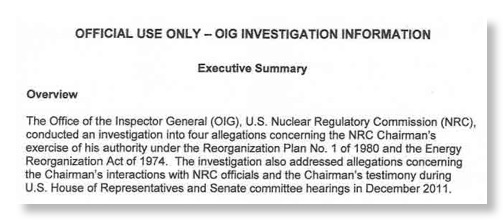
The role of the FCC’s Inspector General has been a recurring topic here. Especially the historic unwillingness of the FCC’s IG to look into the functioning of the Commission and instead to focus nearly all resources on the fraud issues that are also a legitimate part of the IG role. An earlier pair of posts here was entitled “A Credible Inspector General Would Make FCC More Credible”.
It was pointed out that ALL federal agency IG’s have the same legislative charter.
They are ALL obligated by 5 USC App. 4(a)(2)
to review existing and proposed legislation and regulations relating to programs and operations of such establishment and to make recommendations in the semiannual reports required by section 5 (a) concerning the impact of such legislation or regulations on the economy and efficiency in the administration of programs and operations administered or financed by such establishment...
The only difference between cabinet level IGs and independent agency IG’s is who appoints them and whether they are subject to Senate confirmation. Their roles and obligations are identical under the above statutes.
The above report was obtained by and published by The Hill and summarizes a recent NRC IG report about possible transgressions by its chairman. Those of us who remember Chairman Kevin Martin may recognize some parallel issues. Of course, Chmn. Martin never had to worry of the FCC IG would ask questions like when he “attempted to control the content and flow of information to the Commission” (“Issue 3 Allegation” , p. v) or whether the “Chairman’s interpersonal interactions with (the Commission) staff and Commissioners has created a chilled workplace environment” (“Issue 5 Allegation”, p. vii) Perhaps if Kevin Martin had had a truly independent IG he might have moderated his behavior - either in response to such oversight or might have avoided some of his bizarre actions if he knew such oversight was possible - and the FCC might have been more productive during his tenure
Until the appointment of the present IG, all FCC IGs had been long term FCC staffers who were known not to “shake the boat”. Indeed, the previous IG, while he was working in OET, told an acquaintance of mine who worked for him that he should not be concerned about a clear violation of ex parte rules because that was just accepted practice at FCC!
FCC as an institution never learns from previous problems. Isn’t the current problem at TV channel 51 with adjacent mobile bands a close cousin of the Channel 14 and 69 problems of the 1980s? Didn’t FCC staff cover up the existence of police radar detector interference to VSATs for a decade before acting? Why don’t emerging interference problems become visible on policy makers’ desks? What can be learned from the GPS/LightSquared issue? Indeed, an FCC IG review of GPS/LS might have made the Commission’s actions seem more reasonable and responsible. As I said earlier, “A Credible Inspector General Would Make FCC More Credible”.
UPDATE
The whole NRC IG report has still not been made public, although Chairman Jaczko has issued a public statement disputing it. However, some publications apparently have the whole text now. Here as some juicy tidbits that Platts.com published:
The IG's report follows complaints by NRC's four other commissioners late last year that Jaczko was prone to angry outbursts and withheld information from his colleagues.
The report described two tense interactions between Jaczko and (NRC Commissioner Kristine) Svinicki that left her "shaken" and describes another incident after which Svinicki was apparently unwilling to be alone in her office after business hours.
The report said that in March 2011, an unnamed witness said Jaczko stormed to Svinicki's office after hours, upset about a letter Svinicki and other commissioners had sent to a member of Congress. Finding her office locked, Jaczko "was ranting, cursing and had banged on Commissioner Svinicki's suite door," the staff witness told Svinicki later, according to the IG report.
Svinicki was inside her office but did not hear Jaczko, the report said.
After learning of the event, Svinicki changed her behavior, leaving the office as soon as her staff departed for the day and being escorted to her car for a period of time, the report said.
And
The report included 15 examples where Jaczko's behavior, according to the IG report, "was not supportive of an open and collaborative work environment" and left some subordinates feeling "bullied."
Commissioner William Ostendorff told the IG that in a "very heated" meeting about post-Fukushima agency actions, Jaczko "lost his temper," then threw his gavel on the table and closed the meeting while Ostendorff was still speaking.
The IG said it had received a statement in March from Jaczko's attorneys saying the chairman had taken "numerous steps" since the December hearings to improve his relationship with commissioners and staff.
The report concluded that Jaczko's testimony to Congress during the December hearings was different from what staff told the IG in five areas but said the Department of Justice concluded "the matter did not warrant prosecution."
Doesn’t this remind you of Chmn. Martin?
FCC & The GSA Scandal
You probably have read more than you ever wanted to know about the recent GSA Las Vegas conference scandal. For those who have been on Mars for the past week, USA Today reports
General Services Administration is resigning and two top aides have been fired over an $835,000 training conference in Las Vegas that included a mind reader and commemorative coins.
"The president was informed before his trip to South Korea, and he was outraged by the excessive spending, questionable dealings with contractors and disregard for taxpayer dollars," said White House chief of staff Jack Lew.
Obama "called for all those responsible to be held fully accountable given that these actions were irresponsible and entirely inconsistent with the expectations that he has set as president," Lew said.
However, there are indications that these lavish conferences may have begun under Bush 43:
The Obama administration has come out and criticized the shocking spending and is now pointing the finger at the Bush administration for the problem. A White House official has said that in 2004, the conference cost $93,000; in 2006, the cost had ballooned to $323, 855; and by 2008, it hit $655, 025.
So what is the FCC connection?
- Robert Peck, until recently Commissioners of the Public Building Service mysteriously worked in the Office of the Managing Director in the past where he bore much of the brunt of the Republican criticism of the Portals selection for FCC’s current lease
- This scandal was uncovered by GSA’s Inspector General. FCC leadership, under all recent chairmen, need not fear such sleuthing since the FCC Inspector General constantly ignores his statutory charter and focuses on issues that couldn’t embarrass the “8th Floor”.
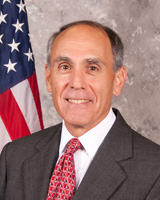
Robert A. Peck serves as the Commissioner of Public Buildings for GSA. He was appointed to this position on August 19, 2009.As Commissioner, Peck is responsible for the nationwide asset management, design, construction, leasing, building management and disposal for 375 million square feet of government-owned and leased space, accommodating 1.1 million federal workers. Additionally, he oversees annual revenue of more than $9.4 billion and a workforce of 6,750.
Most recently, Peck served as a managing director of Jones Lang LaSalle, where he advised corporations, governments, and nonprofit institutions on real estate portfolio strategy and on public-private, mixed-use developments. He previously served as Commissioner of Public Buildings during the Clinton administration.
His prior federal experience includes positions at the Office of Management and Budget, the National Endowment for the Arts, and the Federal Communications Commission. On the U.S. Senate staff, he was associate counsel to the Committee on Environment and Public Works and Chief of Staff to the late U.S. Senator Daniel Patrick Moynihan. He has also been a land-use and real estate lawyer, president of the Greater Washington Board of Trade and vice president for public affairs at the American Institute of Architects.
Peck served as a Special Forces officer in the U.S. Army Reserve. He is a past president of the D.C. Preservation League, a former appointee to the D.C. Board of Education and has served on numerous other public and nonprofit boards.
Peck holds a bachelor’s degree in economics from the University of Pennsylvania, a Juris Doctor from Yale Law School and was a Visiting Loeb Fellow at Harvard University’s Graduate School of Design.
The FCC website search engine has no information on Mr. Peck, perhaps because his service at FCC was in the early Hundt Chairmanship when the website was just coming into creation. (FCC alums recall that Hundt’s predecessor brought FCC touch tone phones to replace dial ones and a desktop computer system using VT-100 “smart terminal” clones that was obsolete upon arrival.) I recall speaking with Peck several times when he mysteriously came from The Hill to take a top job in the Managing Director’s Office. He seemed like a nice enough guy who asked a lot of good questions about FCC, although I can’t recall what topic I was working with him on.
The Republican criticism of the FCC Portals move often includes Peck as a bad guy as shown in this article from our local right wing free newspaper. However, when I was in the former Field Operations Bureau, now Enforcement Bureau, the most secret project I ever saw was covert measurements of new location for FCC headquarters that were made at the direction of the Chairman’s Office - involving multiple chairmen from both parties. The purpose of these measurements was to use FOB’s minimal radio monitoring capability at headquarters as an excuse to eliminate certain sites and favor others. So one had to know the spectrum characteristics of each site in order to “tilt” the RFP to favor/disfavor certain ones. This was a bipartisan game during the near 2 decade search for a new site after the Rosslyn site (later leased to USA Today, which has since moved elsewhere) went down during the early Reagan Administration.
Mr. Peck was an example of politically connected people who were cycled through high FCC management positions to groom them for higher positions in other agencies. This has also been a bipartisan practice at “independent” FCC to do such favors for whoever is in the White House and has further muddied FCC management capability and the lowered the morale of well motivated career civil servants.
On the 2nd point, readers may recall that the dismal state of the FCC Inspector General’s office for the past decade or so has been a recurring theme. The GSA scandal was uncovered by GSA’s Inspector General. Both the GSA IG and FCC’s IG have the same exact basic responsibility: They are both obligated by 5 USC App. 4(a)(2)
to review existing and proposed legislation and regulations relating to programs and operations of such establishment and to make recommendations in the semiannual reports required by section 5 (a) concerning the impact of such legislation or regulations on the economy and efficiency in the administration of programs and operations administered or financed by such establishment...
The only difference is that the FCC IG is appointed by the Commission upon recommendation by the Chairman and the GSA IG, like most major agency IGs is appointed by the President with Senate confirmation. But the obligations are the same.
While the current FCC IG is not an 8th Floor intimate like all his predecessors, he has chosen to continue their practice of focusing almost entirely on external fraud issues involving the Universal Service Fund that are within his charter and avoiding issues of internal FCC operations that would appear to be required by 5 USC App. 4(a)(2) but which might be embarrassing to the 8th Floor. Thus do not expect any IG reports on what were the root causes of the GPS/LightSquared flap or the Channel 51 controversy. A functional IG could help FCC learn from the past, but this seems unlikely to happen soon. So if FCC had a GSA-like scandal, the FCC IG would never be the one to reveal it. (Actually, FCC discretionary appropriation - the amount in excess of fixed costs such as salaries and rent -is so small that FCC could never spend as much money as GSA did.)
| The Daily Show with Jon Stewart | Mon - Thurs 11p / 10c | |||
| GSA-holes | ||||
| ||||
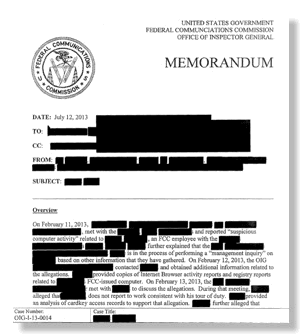
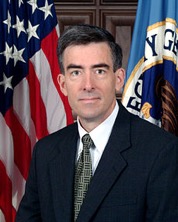
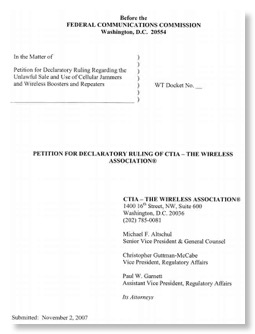
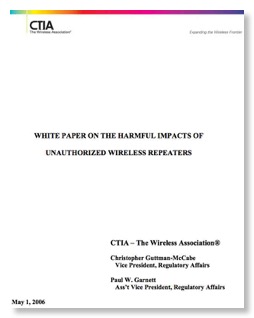



![Validate my RSS feed [Valid RSS]](valid-rss-rogers.png)

